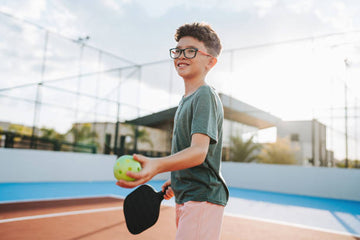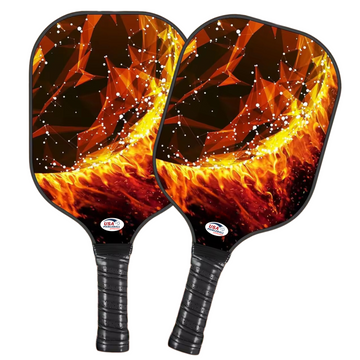Pickleball is a fast-growing sport that is easy for children to learn and play. It combines simple rules with fun, active play, which makes it a great choice for kids who want to stay healthy and enjoy being outdoors. It helps children build coordination, stay active, and develop social skills in a safe and supportive environment.
The sport is accessible to kids of different ages and skill levels because it uses smaller courts and lighter paddles. This makes it easier for children to stay engaged and feel successful while playing. Pickleball also encourages teamwork and communication, which can boost a child’s confidence and help them make new friends.
Many parents and coaches see pickleball as a good way to support a kid's long-term physical and emotional growth. It provides a foundation for healthy habits and positive experiences through exercise and social interaction.
The right paddle helps kids grow in coordination, confidence, and connection
Key Takeaways
-
Pickleball helps kids develop physical skills and stay active.
-
It supports social growth by encouraging teamwork and friendships.
-
The sport is easy for children to learn and enjoy.
Health Benefits of Pickleball for Kids
Pickleball helps children grow strong and healthy by improving how they move and stay active. It builds important skills that support their physical and mental well-being in clear ways.
The right pickleball paddle helps kids stay active, healthy, and happy—one game at a time
Physical Fitness and Motor Skills
Playing pickleball boosts children's fitness by involving running, jumping, and swinging. These actions help build endurance, strength, and speed. Because the court is smaller than a tennis court, kids get plenty of movement without getting tired too fast.
The right pickleball paddle helps kids boost their fitness and sharpen motor skills with every swing
The sport also helps develop fine motor skills. Hitting the ball with a paddle requires hand strength and control. This improves hand strength and control. This improves the way children use their hands and fingers in daily tasks like writing or drawing.
Development of Coordination and Balance
Pickleball challenges kids to coordinate their eyes, hands, and feet at the same time. Tracking the ball while moving helps sharpen hand-eye coordination. This is important for many sports and everyday activities.
With the right pickleball paddle, kids can build better balance and coordination while having fun
Balance is another skill that improves with pickleball. Players must shift their weight and stay steady while hitting or moving around the court. Practicing these movements builds stronger core muscles and better posture.
Encouraging an Active Lifestyle
Pickleball encourages kids to spend more time away from screens and being active. It is easy to learn and can be played indoors or outdoors, making it accessible year-round.
The right pickleball paddle gets kids moving, playing, and loving an active lifestyle
The social aspect of the game helps kids enjoy exercise. Playing with friends creates motivation to stay active regularly. This fosters habits that can lead to a lifetime of healthy choices.
Social and Emotional Growth Through Pickleball
Pickleball helps children develop important social and emotional skills. It offers chances to work with others, feel more confident, and build friendships in a fun, active way.
Building Teamwork and Communication Skills
Pickleball requires players to talk and work closely with teammates. Kids learn when to call the ball, share strategies, and pay attention to their partner's movements. This helps them practice clear communication.
The right pickleball paddle helps kids connect, communicate, and grow as a team on the court
Playing doubles teaches children how to support each other and adjust during the game. They must trust their partner and cooperate to win points, which builds teamwork habits.
These skills transfer outside the court. Kids improve how they work in groups at school or in other activities by practicing teamwork in pickleball.
Boosting Confidence and Self-Esteem
Each time a child makes a successful serve or scores a point, it raises their confidence. Pickleball's simple rules and quick pace let kids experience small wins often.
Children also gain confidence by mastering new skills like serving or volleying. Learning and improving motivates them to keep trying.
With the right pickleball paddle, every swing builds a child’s confidence and self-esteem
Even when they lose, kids learn to handle disappointment and keep a positive attitude. This helps build emotional strength and self-esteem over time.
Making Friends and Social Connections
Pickleball is a social sport played with others, which makes it easy for kids to meet new people. Playing regularly creates a friendly environment where kids bond over shared goals.
Mixing players of different ages and skill levels helps children learn from others and feel included. Many find that playing pickleball leads to lasting friendships.
Group practices and local pickleball events provide kids with chances to connect beyond just playing, improving their social skills in real situations.
Pickleball Basics and Accessibility for Children
Pickleball has simple equipment and rules that make it easy for kids to start playing quickly. It also focuses on safety and fun, helping children build skills with age-appropriate methods. These factors make pickleball a good choice for young players.
Easy-to-Learn Rules and Equipment
The rules of pickleball are straightforward. Players hit a lightweight ball over a low net using a paddle. The goal is to keep the ball in play and score points by making the ball land inside the opponent's court.
The equipment is kid-friendly. Paddles are smaller and lighter than tennis rackets. The ball is perforated plastic, which moves slower and bounces predictably. Courts are smaller than tennis courts, reducing the need for fast running.
Kids can start by practicing simple skills like serving and returning the ball. This helps them understand the game fast and enjoy playing without confusion.
Safety Considerations for Young Players
Safety is a priority for children playing pickleball. The court surface is flat and usually made of smooth material like wood or asphalt, which lowers the chance of tripping. Shoes with good grip help prevent slipping.
Because the game uses a slow, light ball, the risk of injury from being hit is low. Players should still wear proper shoes and comfortable clothing for protection. Teaching kids about fair play and respect on the court also helps avoid rough contact.
The right pickleball paddle helps young players stay safe while learning the game with confidence
Parents and coaches should make sure kids warm up before playing to avoid muscle strains. Hydration breaks are important, especially during outdoor games on warm days.
Age-Appropriate Ways to Get Started
Young children can begin with mini-games that focus on hand-eye coordination rather then full matches. Using smaller courts or dividing the court into sections helps keep rallies short and manageable.
Coaches often introduce drills that build basic skills like hitting, serving, and moving on the court. These activities are done in a fun, low-pressure environment to keep kids interested.
Group lessons or family play times provide social support and motivation. Equipment designed for kids, like lighter paddles, helps beginners improve faster and enjoy the sport safely.
Supporting Long-Term Development With Pickleball
Pickleball offers a clear path for kids to improve their skills over time. It also helps children enjoy sports in a way that builds good habits for life.
Opportunities for Skill Progression
Pickleball has simple rules at first, which lets kids start playing quickly. They learn basic skills like hitting, serving, and moving on the court.
The right pickleball paddle grows with your child, supporting every step of their skill progression
As children get better, they can practice more advanced techniques, such as spin shots and better positioning. Playing games with different players helps them adapt and think strategically.
Many local clubs and schools offer leagues or camps. These give kids goals to improve and keep learning. Skill levels are often grouped, so children compete with others at similar stages, making it fair and fun.
Cultivating a Lifelong Love of Sports
Pickleball is a social game, which helps kids enjoy time with friends and family. This positive experience encourages them to keep playing.
The sport's low impact means it is less likely to cause injuries compared to some other sports. This makes it easier for children to play regularly without pain.
Because pickleball can be played for life by people of all ages, kids who start young often stay involved. They build habits of staying active, which helps their health over time.
Benefits of Pickleball for Long-Term Growth:
|
Category |
Benefit |
|
Physical Health |
Improves Cardiovascular fitness and overall endurance |
|
Enhances coordination, balance and flexibility |
|
|
Helps maintain a healthy weight overtime |
|
|
Brain Health |
Boost cognitive function and memory retention |
|
Encourages neuroplasticity through learning new skills |
|
|
Enhances mental agility and quick decision-making |
|
|
Emotional Well-Being |
Triggers endorphin release for a better mood |
|
Reduces stress and anxiety through physical activity |
|
|
Supports emotional resilience and long-term mental wellness |
|
|
Social Connection |
Builds friendships and a sense of community |
|
Reduces loneliness and increases emotional support |
|
|
Encourages consistent participation through social motivation |
|
|
Lifelong Engagement |
Easy to play at all ages, promoting lifelong fitness |
|
Adaptable for various skill levels and physical conditions |
|
|
Fosters a fun, low-barrier way to stay active and engaged over the years |


